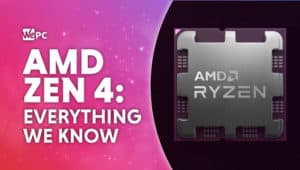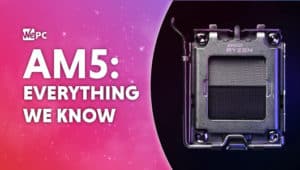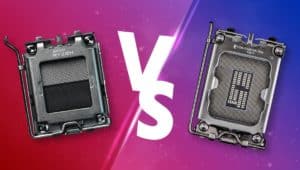AMD Ryzen 7 7700X vs Ryzen 7 5700X
Ryzen 7 7700X vs Ryzen 7 5700X. Which is better? And why?
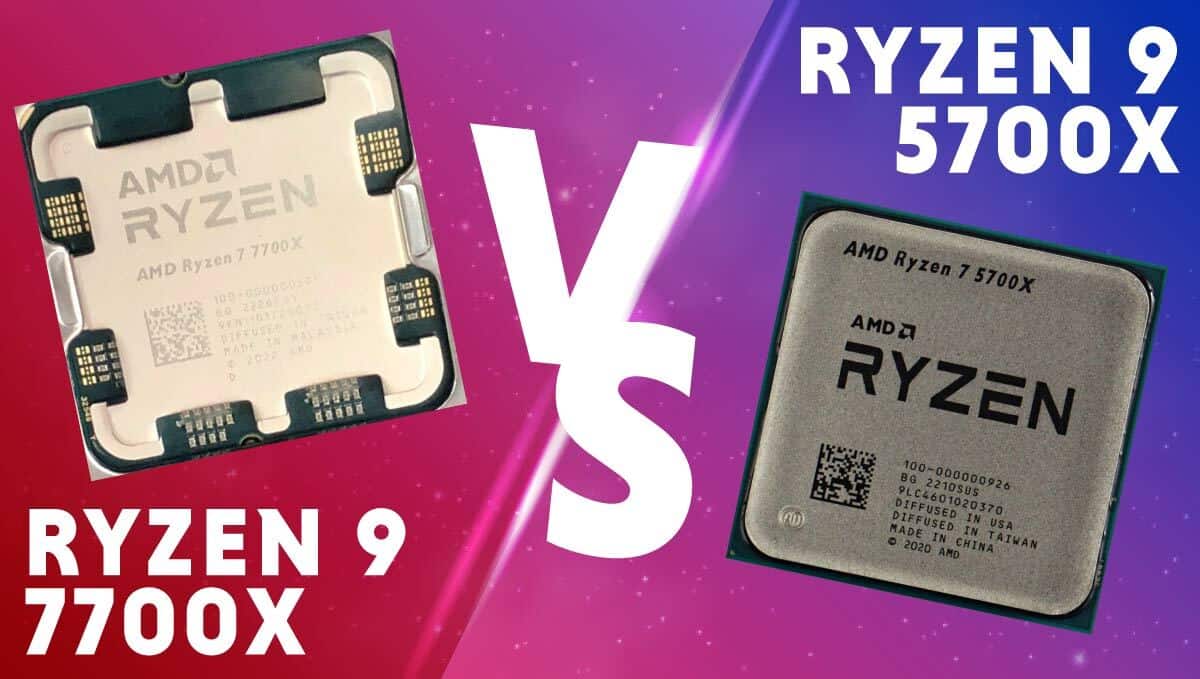
WePC is reader-supported. When you buy through links on our site, we may earn an affiliate commission. Prices subject to change. Learn more
Ryzen 7 7700X vs Ryzen 7 5700X which is better? AMD released its Zen 4 CPUs to the world, on September 2022. One of the CPUs on that list is the formidable Ryzen 7 7700X. AMD’s brand-new CPUs promise performance improvements as we’ve never seen before. The 7700X is definitely a force to be reckoned with and is a CPU that deserves serious consideration.
LIVE NOW: AMD Ryzen 7000 series CPUs are on sale worldwide.
Ryzen 7000 series is available right now. Buy the AMD Ryzen 7 7700X now!
However, performance costs money, especially when you have to fork out for a new motherboard and DDR5 memory. As of now, there are no plans to make Zen 4 compatible with DDR4 RAM. So, is upgrading to the Ryzen 7 7700X a good choice? Or is sticking with the 5700X still the way to go? Let’s find out.
AMD Ryzen 7 7700X
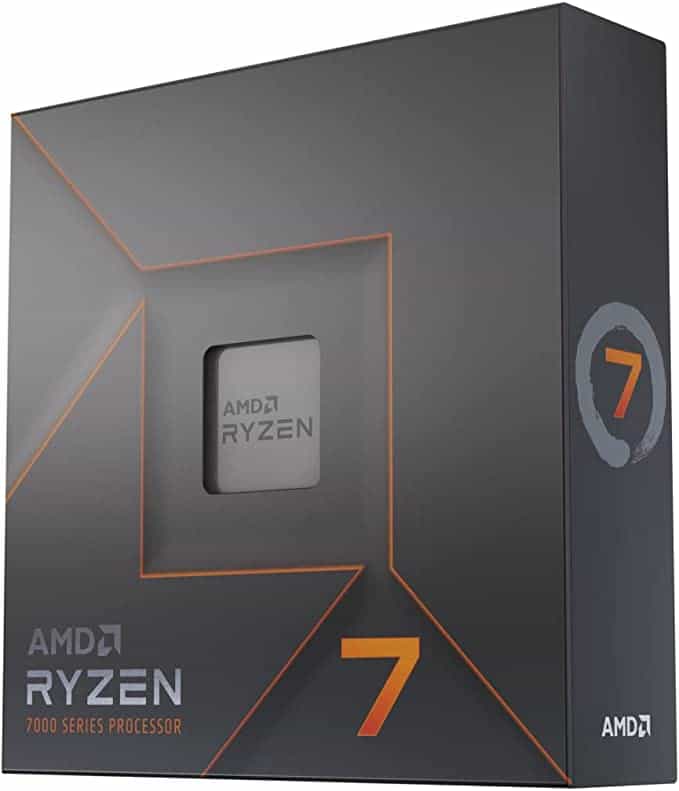
Cores
8
Threads
16
Base speed
4.5GHz
Boost speed
5.4GHz
Cache
32MB
Socket
AM5
We’re going to be examining each CPU and determining which one is better based on the information we have on the Zen 4 CPUs.
We’ve determined that the Ryzen 7 7700X is one heck of a CPU, but will it stand up to the 5700X? Although it has the jump in a lot of areas, there’s no way you’ll be able to pick a 7700X up for the price of a 5700X. So will the increased performance be worth the extra cost?
Ryzen 7 7700X unveiling
Zen 4 Ryzen 7000 series CPUs were unveiled scoring massive points and high frame rates, in both synthetic and real-world benchmarks. We have a whole article covering the performance of the new Ryzen 7000 series CPUs in detail here: AMD unveils Ryzen 7000 series specs, price, and more.
The event focused primarily on the Ryzen 9 7950X and its huge lead over the competition’s i9-12900K.
Not only is the Ryzen 9 7950X up to 62% faster than the 12900K, but it also delivers all this performance at much better power efficiency. The 7950X has been rated as 47% more power efficient than the Core i9-12900K.
Geekbench scores:
Performance: Geekbench 5.4 single-thread performance vs 12900k
- 12900K ~ 2040 points
- 7600X ~ 2175 points
- 7700X ~ 2225 points
- 7900X ~ 2250 points
- 7950X ~ 2275 points
Not only that but projected IPC improvements appear to be higher than even AMD predicted.
AMD CEO Dr. Lisa Su explained during the event that, IPC increases are up to 13% over Zen 3 CPUs. This is huge at core frequencies approaching 6GHz.
Ryzen 7 7700X vs Ryzen 7 5700X: Specifications
When comparing any two PC components, it’s imperative you analyze the specifications of each component and compare them. This will give us a good understanding of how the two components will perform in relation to one another.
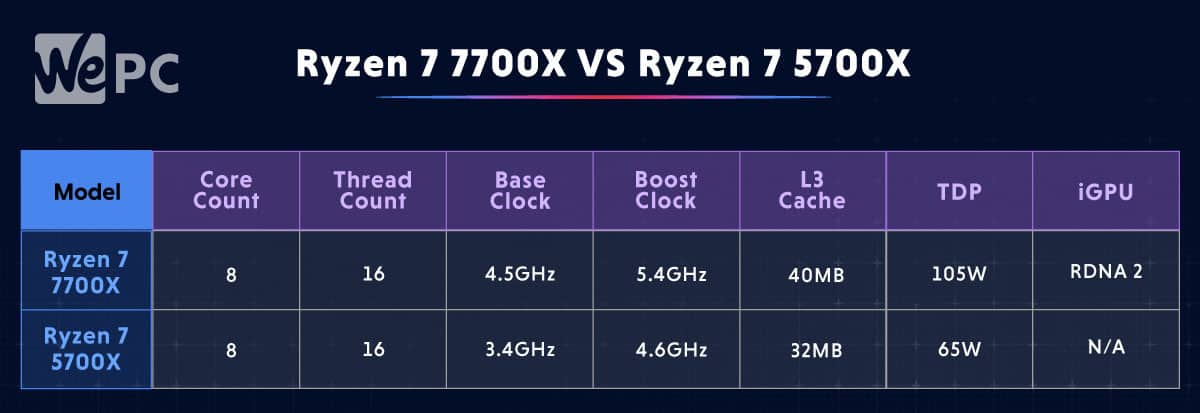
Ryzen 7 7700X
The Ryzen 7 7700X is a high-mid range CPU designed to bring performance at a price that users can afford. And promised to lead the charge in affordable high-performance computing.
The specifications of the Ryzen 7 7700X are as follows:
- Cores: 8
- Threads: 16
- Base clock frequency: 4.5 GHz
- Boost clock frequency: 5.4 GHz
- L3 cache: 40MB
- TDP: 105W
- iGPU: RDNA 2
Ryzen 7 5700X
The Ryzen 7 5700X has been a budget favorite for a couple of years now, bringing users affordable performance, this CPU still holds up today as one of the best price-to-performance CPUs.
The specifications for the Ryzen 7 5700X are as follows:
- Cores: 8
- Threads: 16
- Base clock frequency: 3.4 GHz
- Boost clock frequency: 4.6 GHz
- L3 cache: 32MB
- TDP: 65W
- iGPU: N/A
7700X vs 5700X: Specification comparison
Here we will compare the specifications of both the Ryzen 7 7700X and the Ryzen 7 5700X, to see how they both stack against each other on paper. This should help you make an informed decision when comparing any two types of PC components in the future.
Core and thread count
Both the 7700X and the 5700X have the same number of cores and threads.

Core count
A CPUs core count directly correlates with its multi-core performance, no surprises there. The more CPU cores a CPU has, then the better its ability to multitask. There are other metrics that affect this, but the core count is the main one. CPU cores work together to chew through heavy CPU loads faster.
The higher number of cores a CPU has then the better its ability to multitask generally, giving you better multi-core performance.
Thread count
The thread count is similar to the CPUs core count, but not the same. The more threads a CPU has then the better at multitasking it will be. But threads are slightly different from cores.
Threads are the name given to the second instruction a CPU core can process simultaneously with the primary instruction. Threads are a “virtual CPU core” within the CPU core. However, threads have to share system resources with CPU cores, and are slightly slower as a result, as physical cores have resource priority.
Clock speed
The Ryzen 7 7700X has a faster base core and boost speed.

A CPU’s clock speed is a measure of how many times per second a CPU can perform a “cycle” under normal operating conditions.
A CPU cycle is usually measured in (Hz) and referred to as a frequency. A “cycle” consists of three main actions, fetch, decode, and execute. These are the actions that make up fundamental computing within a CPU.
The faster the clock speed the more instructions per second can be executed, making for a faster CPU.
CPU core speed has a direct impact on the CPU’s single-core performance.
Cache
The Ryen 7 7700X has a larger cache capacity than the 5700X. Not only that, the 7700X has double the L2 cache per core, up to 1MB from 512KB.

A CPU cache is storage hardware built into a CPU, located much closer to processing cores than standard memory for speed and accessibility reasons. The closer a cache is constructed to a CPU core the faster it can pull data from it.
Only the most important CPU instructions are stored in the higher levels of cache (L1, L2). The cache is comprised of three levels and is structured as follows.
- L1
- L2
- L3
Level one cache is built physically closest to the CPU cores, and has the fastest access speeds but also the smallest cache capacity. This is reserved for vital data like vital OS instructions.
Level two cache is a middle ground between L1 and L3, with median capacity and speed, reserved for less vital data.
Level three cache is where most of your frequently accessed data is stored. L3 cache has a very large capacity in comparison to the other levels but is also much slower. When we say slower, we still mean much faster than system memory.
Usually, CPUs with higher core counts have larger cache capacities to support the larger number of processing cores. AMD has upped the cache per core to 1MB in the Ryzen 7000 series.
TDP
The Ryzen 7 5700X has a lower TDP than the 7700X.

TDP stands for Thermal Design Power and is defined as the maximum amount of thermal energy an electrical component con output under normal operating conditions. Nearly all electrical components have a TDP.
CPUs with a higher TDP are usually more powerful, however, this isn’t always the case as the CPU could be older and much less power efficient.
In our case though, the 7700X is much more powerful than the 5700X as evident by massively increased clock speeds. Generally, a lower TDP is better. But we can excuse the hike in TDP given the spec differences.
Socket
The CPUs on the list today belong to different sockets, the 7700X belongs to socket AM5, and the 5700X belongs to socket AM4.

CPU and motherboard sockets can be thought of as puzzle pieces, only CPUs and motherboards with the same socket type are compatible with each other.
You have to take into account the upgrades needed to make the Ryzen 7 7700X compatible with your system, you’ll have to purchase a new motherboard and DDR5 memory. As of now, there are no plans to make Zen 4 CPUs compatible with DDR4 memory.
This is all thanks to AMD moving to the LGA socket architecture over the previous PGA configuration AM4 used for the last 5 years.
Remember, the Ryzen 7 7700X will NOT be compatible with your current AM4 system.
iGPU
The Ryzen 7 7700X comes equipped with an iGPU, whereas, the 5700X does not. (unless it’s the 5700G model)

All of the Ryzen 7000 series CPUs come equipped with an RDNA 2-based iGPU. This is especially useful right now, as it mainly helps reduce the cost of building a whole new system by negating the need to buy a GPU for the system to give a display output.
AMD is famous for its high-performance APUs, so we expect great things from the RDNA2 series iGPUs in the Ryzen 7000 series processors.
Conclusion
Although the Ryzen 7 7700X isn’t out yet, we have to give it a win over the 5700X. Its superior base clock frequencies, massive boost speeds, and large cache size propel the 7700X miles ahead of the 5700X.
The Ryzen 7 7700X is a more budget-orientated CPU, but you still need to upgrade your rig with a new motherboard and RAM to make the Zen 4 CPU compatible. So there’s still a hefty price involved regardless.
The fact that it’s an APU does help ad you don’t NEED a GPU. However, that point does nothing for users who are just upgrading rather than re-building.
Is the Ryzen 7 7700X worth the projected 35% performance improvement? We hope you enjoyed this Ryzen 7 7700X vs Ryzen 7 5700X comparison piece.


